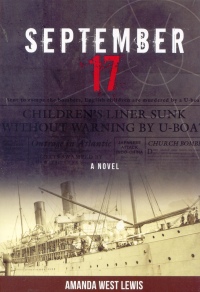| ________________
CM . . . . Volume XX Number 13 . . . . November 29, 2013
excerpt:
September 17th is not a date that looms large on anyone's calendar, unless it should happen to have a personal significance -- a birthday perhaps, or an anniversary. September 17, 1940, was, however, very significant in the lives of all 90 of the children placed by the Children's Overseas Reception Board on the converted cruise ship SS City of Benares en route to Canada. These children were the last of approximately 2700 evacuated from Britain to the colonies to keep them safe from the bombs and threat of invasion, the thinking being that general British resistence would be stiffened if people knew their children at least were safe. Some went to stay with relatives, others with host families for the duration of the war. (Kit Pearson's brilliant trilogy tells the story of two of these children who were looked after by two sisters in Toronto.) As well as the children and their supervisors, there were first-class paying passengers, many of them also children, at the other, 'posh', end of the ship, and many Indian lascars and other crew members who looked after the workings of the ship. For the CORB children, just embarking on the Benares was transportation to heaven: rationing didn't seem to exist; there was even candy! Their convoy, which consisted of a destroyer, several corvettes, and a couple of other lightly armed vessels as well as some slow freighters, was delayed by mines that had been set in Liverpool harbour during a heavy bombing raid just after the children had gone on board, but the convoy finally got underway on September 13 (Friday -- not a good omen!). The trip was uneventful, with everyone enjoying themselves playing shipboard games --- when they weren't seasick --- and eating as much as they were able. On September 16, to quote from the book again, the captain said: "I just wanted to give you all an update on our position, ... We are not out of danger. U-boats patrol this area regularly. However, by this time tomorrow we will be in the American zone. The Germans won't interfere with any ship in neutral waters." This statement was not quite accurate. The Americans did extend their range of influence out from the US east coast in stages until, by 1941 it went as far as Iceland, but in 1940, the waters beyond the British zone were merely 'neutral'. However, the ship was getting out of the congested shipping area close to Europe where U-boats concentrated because the hunting was better, but 'safety' was obviously a relative term. It did mean that on September 17 the warship and corvette escort were justified in steaming off to intercept another convoy approaching England, leaving the Benares and its companion freighters on their own. And in the evening of the 17th, a German U-boat (U-48, if you are interested; Google is wonderful) torpedoed both the Benares and the SS Marina, a lightly armoured boat still travelling with the convoy. Readers are introduced to several of the children in the early chapters of the book – in particular to Ken, who loves to draw, Sonia, one of the paying passengers travelling with her mother and brother and sister, and Bess, a girl who longed to escape her drab existence in England and who persuaded her parents that she and her brother would be safer in Canada. Readers meet others on board the ship and are fully involved with the group and their volunteer leaders by the time disaster strikes. Then readers follow their separate paths to survival, for these are three of the 13 (out of 90) who did survive. It's a harrowing tale, with despair and hope alternating as lifeboats fail to launch properly in heavy seas or capsize as they hit the water. The survivors were mostly just lucky, but luck is nearly always tempered by good leadership, courage, and co-operation. These traits come through very strongly, especially in Lifeboat 12 in which Ken found himself and which was not rescued until over a week at sea. The book is not without its faults. It is slow to get started as readers meet first one and then another character, jumping back and forth among them as the narrative switches to the different families and their situations. The same sort of disconnect occurs after the disaster as well since Ken, Bess, and Sophia all survive separately and in different ways. It is a gripping story, however, and the fact that so many perished while being transported to "safety" is the ultimate irony. Survivors were returned to England to take their chances with the bombs, and the CORB programme was halted. Recommended. Mary Thomas lives in Winnipeg, MB, and is retired but still works occasionally in schools. She only once crossed the north Atlantic by ship, and the one lifeboat drill was scary enough for her.
To comment
on this title or this review, send mail to cm@umanitoba.ca.
Copyright © the Manitoba Library Association. Reproduction for personal
use is permitted only if this copyright notice is maintained. Any
other reproduction is prohibited without permission.
NEXT REVIEW |
TABLE OF CONTENTS FOR THIS ISSUE
- November 29, 2013.
AUTHORS |
TITLES |
MEDIA REVIEWS |
PROFILES |
BACK ISSUES |
SEARCH |
CMARCHIVE |
HOME |
